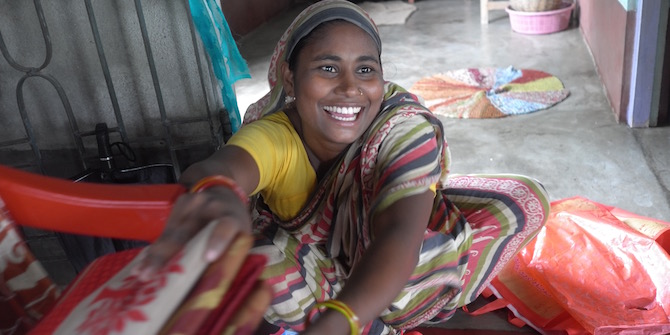

 Prime Minister Narendra Modi’s visit to the United States has brought India’s societal divisions to Western media attention. Trust is central to economic interactions. It is thus crucial that India’s new government identify institutions and policies that promote trust to better enable growth and development, write Minhaj Mahmud, Pushkar Maitra and Ananta Neelim.
Prime Minister Narendra Modi’s visit to the United States has brought India’s societal divisions to Western media attention. Trust is central to economic interactions. It is thus crucial that India’s new government identify institutions and policies that promote trust to better enable growth and development, write Minhaj Mahmud, Pushkar Maitra and Ananta Neelim.
Religion has always been a controversial issue in the Indian subcontinent. South Asians are in perpetual argument about religion, faith and tolerance. There is a sizable segment of the population that identify themselves as being secular, and the political narratives in these countries attempt to accommodate these preferences. Unfortunately, at the same time, the manifestation of communalism and segregation is equally prevalent in the region. This is most commonly reflected in communal riots that cause substantial damage to lives, properties and social capital (in the form of trust and cooperation). In a number of different ways, South Asia is greatly segmented in terms of religion.
Society segmentation on basis of group identities
One of the key factors that drive this kind of segmentation is group identity. Historians have documented that individuals derive a sense of being different from others based on certain group identity and that they often attach certain stereotypes to those belonging to a specific group. This manifests itself in in-group favouritism in behaviour; individuals treat members sharing the same group identity better than others that have a different group identity. Such priorities based on identity may have significant effects on the level of social capital and hence, well-being within these societies. There is now increasing evidence that economic decisions made by individuals are strongly influenced by group membership, and are tied to both social and cultural networks.
However analysing the effect of identity on behaviour is not so straightforward. This is because individuals can simultaneously identify themselves along many different dimensions. In such situations, which particular identity drives a particular behaviour can be difficult to ascertain. In the context of South Asia, identity based on religion runs into this problem. This is because in any one of the South Asian countries (say India, Bangladesh or Pakistan), identity based on religious belonging and identity based on the minority/ majority status that religion generates are strongly associated.
Let us consider the case of Hindus and Muslims in India and Bangladesh. Remember that India is a Hindu-majority country with a sizeable number of Muslims and that Bangladesh is a Muslim-majority country where Hindus form the largest minority group. This means a Hindu (Muslim) in India (Bangladesh) is always identified as having majority status in terms of religious belonging. Now suppose we observe in India that Muslims behave differently as compared to Hindus. Can we attribute such difference to religious belonging? If it is so, we should observe that Hindus always behave in a certain way irrespective of majority (in India)/minority (in Bangladesh) status, and that Muslims always behave in a certain way irrespective of majority (in Bangladesh)/minority (in India) status.
On the other hand, can we attribute the difference in behaviour to minority/majority status? If it is so, then we should observe that individuals with a particular status behave in the same way irrespective of their religion, that is, Muslims in West Bengal and Hindus in Bangladesh should behave in the same way, and Hindus in West Bengal and Muslims in Bangladesh should behave in the same way.
Analysing role of religious identities in behaviour
Economic experiments are very powerful tools to understand behaviour in a controlled environment. To analyse the role of multiple identities (based on religion) in behaviour, we conducted a field experiment focusing on trust behaviour of people of two different religions in Bangladesh and West Bengal. The rationale for focusing on trust behaviour is that trust is very important in these societies due to the limited ability of the State to enforce legal contracts. In fact, Nobel Laureate Kenneth Arrow has argued that “virtually every commercial transaction has within itself an element of trust”, and the economics literature is replete with evidence of trust fostering economic development. We use the standard ‘Trust Game’ to measure trust among Hindus and Muslims in Bangladesh and West Bengal. We conduct the Trust Game in a random sample of 620 Hindu and Muslim households in 32 selected villages in Bangladesh and West Bengal (16 villages in each) based on the percentage of Hindus and Muslims in those villages (defining minority and majority in the village context).
Minority/ majority status based on religion dictates behaviour
Our experimental results show that it is status based on religion rather than religion in itself that dictates behaviour – the minority, on average, irrespective of religion, behaves differently than the majority. Individuals from the minority religion (Hindus in Bangladesh and Muslims in West Bengal) trust their own religion group more than they trust the other religion group. However, they do not show such behaviour when they constitute the majority; Muslims in Bangladesh and Hindus in West Bengal are not found to discriminate against the minority.
In fact, conditional on the level of trust placed by the minority sender, majority receivers shows more trustworthiness towards the former. Consider a majority receiver receiving money from a majority sender versus a minority sender. For the same amount of money received, the transfer from the minority is perceived to be ‘more kind’ than from the majority, as it is a greater deviation from the social norm. Hence, the majority receiver reciprocates by sending back more money to a minority sender (indicating greater trustworthiness). Minorities thus systematically benefit, from higher levels of trust from fellow minorities (minorities sent higher percentage of money to minority receivers), and from higher levels of trustworthiness from members of the majority (higher percentage of money being returned by majority to the minority senders). This is certainly good news for the minority who have often been on the receiving end of discrimination and violence in this region.
We also find that this positive in-group bias on the part of the minority is driven by out-group discrimination and not by in-group favouritism; Minorities both in Bangladesh and West Bengal trust their own status group more than they trust others in general (not knowing religion) implying discrimination to out-group (majority). This behaviour is consistent with the notion of realistic threats that could arise from the fear of the economic and political power of the majority.
We also find that behaviour is significantly influenced by the degree of adherence to religious identity (whether an individual is religious and non-religious). Irrespective of religion and status, religious individuals behave very differently from their non-religious counterparts. In both Bangladesh and West Bengal, religious minorities are inward looking when it comes to trust, exhibiting significant in-group bias in trust. This is not true for their non-religious counterparts. On the other hand, the result that the majority shows more trustworthy behaviour to the minority is driven by the behaviour of the non-religious group members among the majority. These results are perhaps not surprising: one should expect individuals who value religious affiliation less to be less likely to favour in-group members, compared to their more religious counterparts.
Government policies should focus on assimilating minority groups
Trust based on status is a crucial finding. This suggests that it may be more worthwhile to view interactions and behaviour in segmented societies through the lens of minority/ majority status (based on religion), rather than only religion itself. In terms of policy, the results imply that governments should devise policies to foster trust within communities, particularly focusing on assimilating minorities. One possible avenue could be to assuage the fear of minorities by ensuring their rights are protected by the legal system and that these rights are not corroded by the might and power of the majority. Additionally, substantive government investment in the socio-economic development of the minority, including infrastructural improvements in minority-concentration areas, might empower minorities, which may translate into greater minority assimilation and a more cohesive society in the longer run.
Concluding thoughts
As argued by Amartya Sen, a general sense of social identity and priorities play a considerable part in an individual’s economic decisions. Therefore, better insight into different identities and their implications for behaviour will facilitate our understanding of fractionalisation within the communities. Trust is crucial for economic interactions when contracts are incomplete and/ or weakly enforced. It is not inconceivable that bias or discrimination in trust that we observe in our experimental setting will be reflected in discrimination in other spheres of life. Understanding the nature of the bias can help in designing appropriate policies and thus, is a crucial first step in integrating segmented societies. It then becomes crucial to identify institutions and policies that promote trust and reduce fractionalisation within the society to attain positive impacts on growth and development.
This post originally appeared on The International Growth Centre blog. It is reposted with permission.
Image credit: flickr/Rajarshi Mitra
About the Authors
 Minhaj Mahmud is currently Head of Research of Brac Institute of Governance and Development at Brac University Dhaka, Bangladesh.
Minhaj Mahmud is currently Head of Research of Brac Institute of Governance and Development at Brac University Dhaka, Bangladesh.
 Pushkar Maitra is Professor of Economics at Monash University. His specific research interests are analysis of poverty and welfare in developing countries; health, education and human capital accumulation; fertility, mortality and gender preference with special focus on South Africa and South Asia.
Pushkar Maitra is Professor of Economics at Monash University. His specific research interests are analysis of poverty and welfare in developing countries; health, education and human capital accumulation; fertility, mortality and gender preference with special focus on South Africa and South Asia.
 Ananta Neelim is a doctoral candidate at the Department of Economics at Monash University.
Ananta Neelim is a doctoral candidate at the Department of Economics at Monash University.







